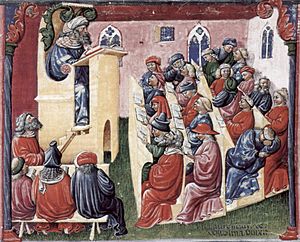Learning facts for kids

Learning is how we get new information and skills into our brain. It's a key part of growing up and understanding the world around us. From remembering facts for a test to learning how to ride a bike, learning helps us adapt and grow.
Learning can happen in many ways. Sometimes we learn without even trying, and other times we learn by practicing something over and over. Our brains are always changing and making new connections as we learn. This process helps us remember things and use what we've learned in new situations.
Contents
How We Learn: Different Types of Learning
There are many ways that humans and animals learn new things. Each type helps us understand and react to our environment.
Learning by Association: Conditioning
- Classical conditioning: This is when you learn that two things go together. For example, if a bell always rings right before you get food, you might start to feel hungry just by hearing the bell. Your brain connects the bell with food.
- Operant conditioning: This type of learning happens when your actions have consequences. If you do something and a good thing happens, you're more likely to do it again. If a bad thing happens, you're less likely to repeat it. It's like learning from rewards and punishments.
Learning Through Experience and Observation
- Play: For many young animals, especially mammals, playing is a super important way to learn. It helps them practice skills they'll need later, like hunting or escaping danger, in a safe and fun way.
- Insight learning: Sometimes, you might be stuck on a problem, and then suddenly, the answer just "clicks." This is called insight learning. It's like your brain puts all the pieces together at once to find a solution.
- Imitation and observational learning: We often learn by watching others. When you copy what someone else does, you are using observational learning. This is how we learn many social skills and behaviors.
Learning Without Thinking: Unconscious Processes
- Implicit learning: This is learning that happens without you even knowing it. For example, you might learn the rules of grammar just by listening to people talk, even if no one ever taught you the rules directly.
- Imprinting: This is a very fast type of learning that happens early in life, especially in some animals. For instance, baby birds often learn to follow the first moving thing they see, usually their mother.
The Brain and Learning
Learning isn't just about ideas; it's a physical process in your brain. When you learn something new, your brain cells, called neurons, actually change. They grow new connections, called synapses, and strengthen existing ones. It's like building new pathways in your brain every time you learn.
Even before we are born, our brains start to learn. Studies show that babies can learn and remember things as early as 32 weeks into gestation (when they are still in the womb). This shows how amazing and ready for learning our central nervous system is, right from the start.
Images for kids
See also
 In Spanish: Aprendizaje para niños
In Spanish: Aprendizaje para niños
 | Mary Eliza Mahoney |
 | Susie King Taylor |
 | Ida Gray |
 | Eliza Ann Grier |



